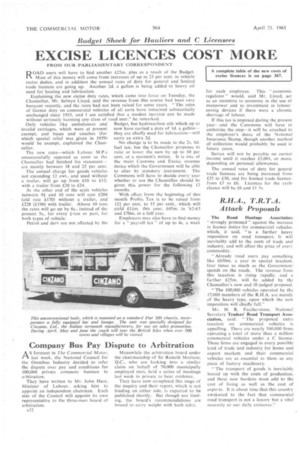Budget Shock for Hauliers and C Licensees
Page 34

If you've noticed an error in this article please click here to report it so we can fix it.
EXCISE LICENCES COST MORE
FROM OUR PARLIAMENTARY CORRESPONDENT
ROAD users will have to find another £25m. plus as a result of the Budget. 1Most of this money will come from increases of up to 25 per cent. in vehicle excise duties, and in addition the annual rates of duty for general and limited trade licences are going up. Another 2d. a gallon is being added to heavy oil used for heating and lubrication.
Explaining the new excise duty rates, which came into force on Tuesday, the Chancellor, Mr. Selwyn Lloyd, said the revenue from this source had been very buoyant recently, and the rates had not been raised for some years. "The rates of licence duty on commercial vehicles of all sorts have remained substantially unchanged since 1933, and I am satisfied that a modest increase can be made without seriously harming any class of road user." he remarked.
Only vehicles like ambulances and invalid carriages, which were at present exempt, and buses and coaches (for which special relief was given in 1959) would be exempt, explained the Chancellor.
The new rates—which Labour. M.P.s unsuccessfully opposed as soon as the Chancellor had finished his statement— are mostly between 18 and 25 per cent.
The annual charge for goods vehicles not exceeding 12 cwt., and used without a trailer, will go up from €19 to €12: with a trailer from £20 to £24.
At the other end of the scale vehicles between 91 and 10 tons will cost £204 (old rate £170) without a trailer, and 1228 (£190) with trailer. Above 10 tons the rates will go up by 6s., instead of the present 5s., for every +-ton or part, for both types of vehicle.
Petrol and dery are not affected by the Budget, but hydrocarbon oils which up to now have carried a duty of Id. a gallon— they are chiefly used for lubrication—will carry an extra 2d.
No change is to be made in the 2s. 6d. fuel tax, but the Chancellor proposes to raise or lower the sum by up to 10 per cent, at a moment's notice, It is one of the main Customs and Excise revenue duties which the Government will be able to alter by statutory instrument, The Commons will have to decide every-year whether or not the Chancellor should be given this power for the following 12 months.
With effect from the beginning of this month Profits Tax is to be raised from 121 per cent, to 15 per cent., which will yield £11m. this year, £45m. in. '62-63 and £70m. in a full year.
Employers may also have to find money for a payroll tax" of up to 4s. a week for each employee. This "economic regulator" would, said Mr. Lloyd, act as an incentive to economy in the use of manpower and to investment in laboursaving devices if there were a chronic shortage of labour.
If this tax is imposed during the present year—and the Commons will have to authorize the step—it will be attached to the employer's share of the National Insurance Stamp, though another method of collection would probably be used in future years.
Surtax will not be payable on earned income until it reaches £5,001, or more_ depending on personal allowances.
The annual rates of duty for general trade licences are being increased from £25 to £30, and for limited trade licence, from £5 to £6. Licences for the cycle classes will be £6 and Ss.




















































































































